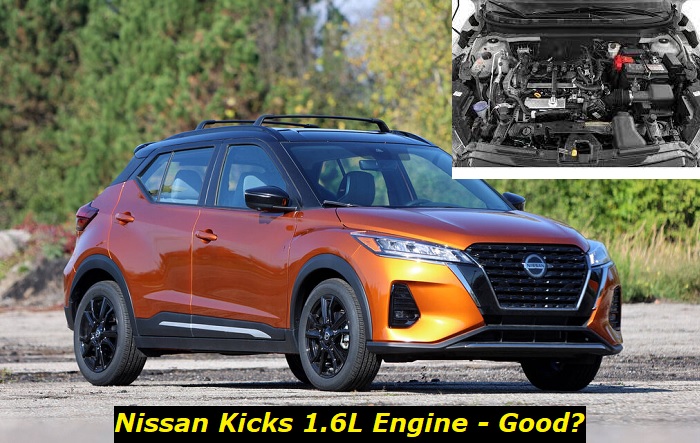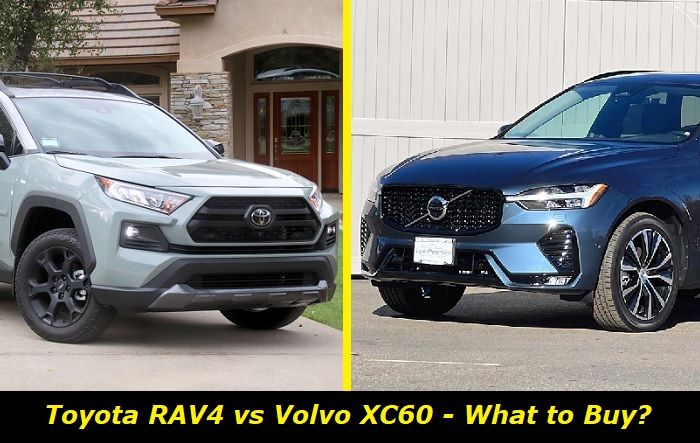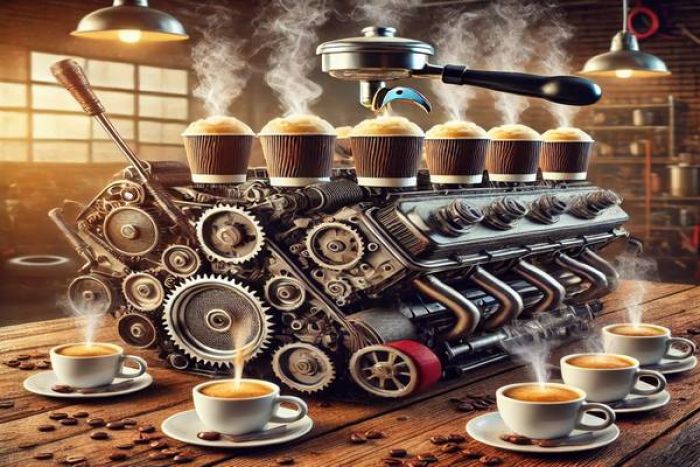The Kicks is the subcompact SUV presented by Nissan in 2016 and then facelifted in 2021. The vehicle is not super popular in the US where people still don't buy a lot of super-small SUVs, but we can see that the sales fluctuate from 50,000 to 80,000 vehicles a year. It's not bad for such a small car. And this makes us dig a little deeper to see why this vehicle attracts buyers so much.
Today, we'll tell you about the 1.6L engine that powers all trims of the Nissan Kicks on the American market and is actually one of the simplest possible engines by Nissan now. Also, we'll tell you more about the transmission and will cover the questions of the quality, durability, and practicality of this technical tandem.

Key features and my opinion about the engine
- Production years:2005-now
- Average lifespan of HR16DE:190,000-220,000 miles
- Fuel supply type:port injection
- Power range:105-120 hp
- Fuel efficiency:good
- Engine block material:aluminum
- Engine reliability score:high
- The most common problems:bad oil consumption, stretching timing chain, weak phaser, no lifters.
Key facts about the 1.6L engine in the Nissan Kicks
This is one of the base engines made by Nissan for modern vehicles - the old good HR16DE which you will also find in the Nissan Versa. We've already written an article about the Versa engine, so have a look to get some more info. But for the Kicks, this engine will act a little differently because the car is heavier and bigger. So, it's worth reconsidering some things we've already stated before.
So, the Kicks has the only available engine. There are no turbo options, no hybrids, etc. The small SUV comes with one of the most practical and simple engines and this is good news for everyone who wants longevity. Though the engine doesn't only have bright sides, unfortunately.
Here are some key things you should know about it:
- this is the 1.6L non-turbocharged 4-cylinder engine that offers 122 horsepower and also 114 lb-ft of torque;
- the engine is old, it was first introduced in 2005 and then went through several modification events to remain OK for modern cars;
- the engine is cheap, so there are no super-modern technologies and we believe it will be discontinued along with current generations of Kicks and Versa;
- the injection system is based on practical port injectors, so no carbon buildup issues or other expensive injection problems are common for it;
- the aluminum cylinder block has cast iron sleeves for pistons and this prolongs the life expectancy of the engine;
- the engine has a phaser for intake valves making it a little more modern and efficient in terms of power and fuel consumption;
- the timing system is driven by a chain and you should pay attention to it because it can break or stretch and cause some problems;
- there are no hydraulic lifters, so you will have to pay for valve adjustment pretty often which is not that cheap.
The injection system is pretty tricky and has two injectors per cylinder. This makes it more powerful than it could be with just one traditional injector per cylinder. But if something goes wrong with the injections system, your budget will feel this.
All Nissan Kicks SUVs come with CVT units and front-wheel drive, you can't choose any other options. The CVT is another object of concerns because usually, Nissan CVTs don't live too long.
The Nissan Kicks with the HR16DE engine can go about 31 MPG in the city and 36 MPG on highways. At least, this is what Nissan claims. We don't know in what kind of city Nissan measured this consumption. But if you drive it in a busy city, it would be great to see 25 MPG. Though, highway mileage is estimated more or less correctly.
How long will the 1.6L Nissan Kicks' engine survive?
In terms of durability, this is probably one of the best Nissan engines today. The machine is well-researched and modified to cope with all prior detected problems. It's a simple and practical engine that is made to last. And we believe 220,000 miles is just a careful average estimation of what it can give you.
But there is a problem and it's called CVT. This transmission is going to cause the first big issues at about 100,000 miles or even earlier. Repairing it is not that easy and cheap so many owners will decide to replace the transmission with a new one. Can you imagine how much it can cost? And then, at about 200,000 miles, the situation will repeat. Replacing the transmission once again is not an option because, at this mileage, all other units in your vehicle are about to die.
So, we should say that the average lifespan of the Nissan Kicks should be about 180,000 miles with one transmission replacement. If you don't want to invest a lot of money in the transmission, consider changing your Kicks once it approaches the 100,000-mile mark.
Unfortunately, Nissan keeps using the CVT which is not only short-lasting but also a little glitchy. And also the super-short warranty of 3 years of just 36,000 miles says us that Nissan knows about the longevity problems and tries hard to limit the amount of warranty payments.
Sorry Nissan, but you didn't pay us to advertise the Kicks! That's a joke, of course.
What are the common problems with the Nissan Kicks engine?
Although we know about dozens of common problems with the HR16DE engine, not all of them will apply to the Kicks. Prior to installing this engine to American versions of the Versa and Kicks, Nissan modified them to address some of the most annoying issues. But we still could find some pinches of salt to add here.
Here are the most common issues to expect with the Kicks' 1.6L engine:
1. Timing chain issues
Approximately, at 70-80 thousand miles, the chain may start rattling. This is a clear sign that it needs to be replaced immediately. Otherwise, the chain may just stretch and jump a tooth or two which will lead to bad engine damage.
Nissan chains are pretty thin and the relatively heavy Kicks will stretch even faster than a smaller Versa. So, replacing the chain kit at 70,000 miles is one of the key recommendations to avoid bad engine issues.
2. Cold start problems
This problem has been here with the HR16DE engine by Nissan for years now. And Kicks owners keep reporting about it. The engine may take much longer to start when it's cold, so keep cranking till it actually starts. If you stop cranking, the plugs will be wet and the spark won't form for some time.
Cold start issues are bad, but you can do nothing with them. This is the problem with the ignition relay that is known to be faulty in many Nissan engines, not just the 1.6L one.
3. Oil consumption and crazy oil service
These engines are prone to oil consumption even when they have only 20,000 or 30,000 miles on them. A lot of dealers and repair shops recommend drivers buy more viscose oil. This is one of the stupid recommendations that may kill your Nissan HR16DE engine, so stay away from any oil that is not recommended by Nissan for this engine model.
Oil consumption is OK for the 1.6L Kicks' engine. It will disappear after piston rings replacement which no one does because it's hugely expensive. So, just add some oil regularly, and don't forget to check the oil level from time to time.
4. Lots of minor problems
Don't forget that this is a budget-friendly engine, so the best teams of Nissan engineers were working on some other project when the HR16DE was engineered or modified. This leads to several minor issues and some of them may actually be expensive to solve.
You will constantly have problems with coils and spark plugs, valve adjustment, exhaust contamination, electrical units, engine mounts, drive belt, etc., etc., etc. Some of these issues are easy to cope with or even put up with. But some of them require immediate repairs.
Not all Nissan error messages are telling you about serious problems. For example, in this article, I've written about the front radar sensor blockage and all possible fixes of this issue. You may want to have a look.
What to do to prolong the life of the Nissan Kicks' engine?
Among some of the special recommendations for this engine to prolong its life, we can come up with the following:
- regular maintenance should be provided more often than the dealership recommends;
- only OEM oil and filters should be bought;
- replace the chain kit at 80,000 miles to avoid problems;
- have the valves adjusted every 50,000 miles or once every 3 years;
- address all minor issues timely, they may easily grow into fatal problems;
- avoid aggressive driving;
- keep an eye on the health of the CVT.
This is certainly not the engine for sporty driving. It's a good choice for a young family for mostly city driving. It doesn't like high speeds and high revs. But if the engine is provided with some TLC, it can live quite long and cause little to no problems.
About the authors
The CarAraC research team is composed of seasoned auto mechanics and automotive industry professionals, including individuals with advanced degrees and certifications in their field. Our team members boast prestigious credentials, reflecting their extensive knowledge and skills. These qualifications include: IMI: Institute of the Motor Industry, ASE-Certified Master Automobile Technicians; Coventry University, Graduate of MA in Automotive Journalism; Politecnico di Torino, Italy, MS Automotive Engineering; Ss. Cyril and Methodius University in Skopje, Mechanical University in Skopje; TOC Automotive College; DHA Suffa University, Department of Mechanical Engineering






Add comment